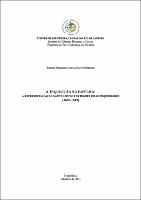Por favor, use este identificador para citar o enlazar este ítem:
http://rima110.im.ufrrj.br:8080/jspui/handle/20.500.14407/9562| metadata.dc.type: | Dissertação |
| Título : | A Inquisição no espelho: a representação do Santo Ofício português pelos inquisidores (1605-1643) |
| metadata.dc.creator: | Ribeiro, Bruno Fernando Silva Matos |
| metadata.dc.contributor.advisor1: | Oliveira, Yllan de Mattos |
| metadata.dc.contributor.referee1: | Oliveira, Yllan de Mattos |
| metadata.dc.contributor.referee2: | Costa, Regina de Carvalho Ribeiro da |
| metadata.dc.contributor.referee3: | Assis, Angelo Adriano Faria de |
| metadata.dc.description.resumo: | Resumo: A presente dissertação tem o objetivo de compreender como o Santo Ofício português se representava diante da sociedade, na primeira metade do século XVII – mais especificadamente entre o perdão-geral de 1605 e a batalha contra os jesuítas da Universidade de Évora, em 1641-3. Isto é, qual o ponto de vista que a instituição produziu sobre si mesma e como apresentava-se e se defendia diante daqueles que a criticavam. Ao percebemos que o Santo Ofício não se imaginava apenas como julgador de heresia, mas como defensora da própria Igreja Católica, buscamos analisar os discursos que a institui-ção produziu para justificar a sua ação no que tange as prerrogativas sobre o julgamento de heresia, a importância da sua existência para o disciplinamento da sociedade portuguesa, e dos privilégios que o Tribunal deveria obter mesmo que o assunto não tocasse em matéria da fé e aos costumes. Sendo assim, investigamos diversos tópicos na intenção de apresentar, por meio da análise de fontes, os principais discursos e posicionamentos das personagens mencionadas nesse estudo, isto é, a comunicação que se deu entre os cristãos-novos, inquisidores, jesuítas e a Coroa. Por fim, a análise que versa a presente dissertação buscará responder as seguintes problemáticas: Quais são as tópicas e os temas utilizados na defesa do Tribunal? Como eram produzidas as imagens discursivas de defesa e justificação da Inquisição? |
| Resumen : | Abstract: This dissertation aims to understand how the Portuguese Holy Office repre-sented itself before society, in the first half of the 17th century - more specifically between the general pardon of 1605 and the battle against the Jesuits of the University of Évora, in 1641-3. That is, what is the point of view that the institution produced about itself and how did it present itself and defend itself before those who criticized it. When we realized that the Holy Office imagined itself not only as a judge of heresy, but as a defender of the Catholic Church itself, we sought to analyze the speeches that the institution produced to justify its action regarding the prerogatives over the judgment of heresy, the importance its existence for the disciplining of Portuguese society, and the privileges that the Court should obtain even if the matter did not touch on matters of faith and customs. Therefore, we investigated several topics with the intention of presenting, through the analysis of sources, the main speeches and positions of the characters mentioned in this study, that is, the communication that took place between the new Christians, inquisitors, Jesuits and the Crown. Finally, the analysis that addresses this dissertation will seek to answer the following issues: What are the topics and themes used in the defense of the Court? How were the discursive images of defense and justification of the Inquisition produced? |
| Palabras clave : | Inquisição Portugal Época Moderna crítica representação Inquisition Modern Period critical representation |
| metadata.dc.subject.cnpq: | História |
| metadata.dc.language: | por |
| metadata.dc.publisher.country: | Brasil |
| Editorial : | Universidade Federal Rural do Rio de Janeiro |
| metadata.dc.publisher.initials: | UFRRJ |
| metadata.dc.publisher.department: | Instituto de Ciências Humanas e Sociais |
| metadata.dc.publisher.program: | Programa de Pós-Graduação em História |
| Citación : | RIBEIRO, Bruno Fernando Silva Matos. A Inquisição no espelho: a representação do Santo Ofício português pelos inquisidores (1605-1643). 2021. 129 f. Dissertação (Mestrado em História) - Instituto de Ciências Humanas e Sociais, Universidade Federal Rural do Rio de Janeiro, Seropédica, 2021. |
| metadata.dc.rights: | Acesso Aberto |
| URI : | https://rima.ufrrj.br/jspui/handle/20.500.14407/9562 |
| Fecha de publicación : | 24-sep-2021 |
| Aparece en las colecciones: | Mestrado em História |
Se for cadastrado no RIMA, poderá receber informações por email.
Se ainda não tem uma conta, cadastre-se aqui!
Ficheros en este ítem:
| Fichero | Descripción | Tamaño | Formato | |
|---|---|---|---|---|
| 2021 - Bruno Fernando Silva Matos Ribeiro.pdf | 3.46 MB | Adobe PDF |  Visualizar/Abrir |
Los ítems de DSpace están protegidos por copyright, con todos los derechos reservados, a menos que se indique lo contrario.

